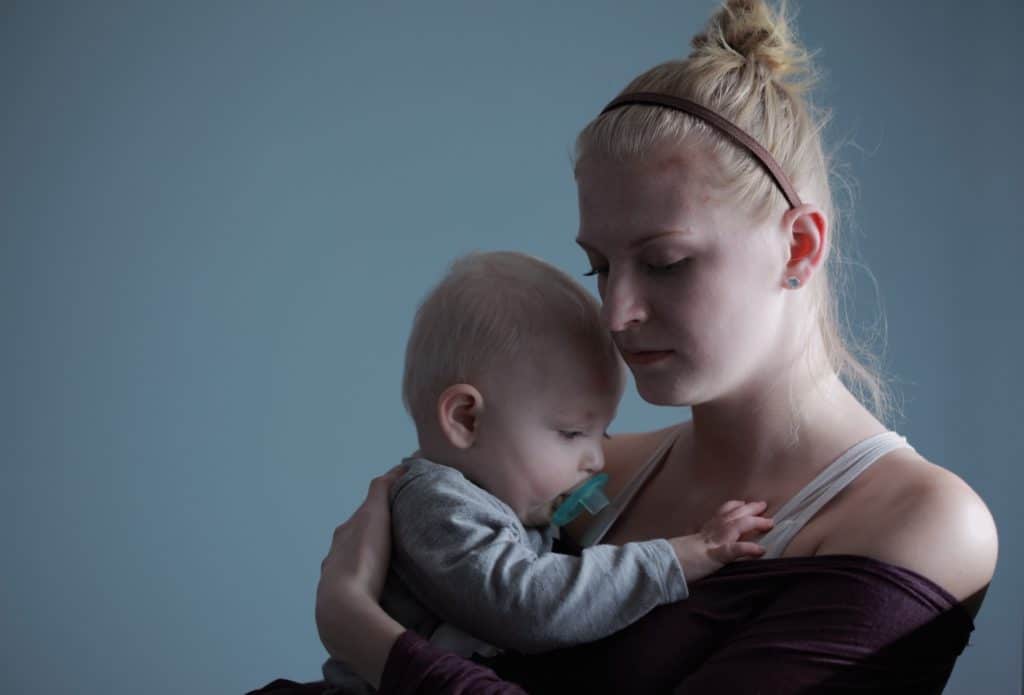Most new mothers experience a great variety of emotions following childbirth. They’re joyful, overwhelmed, happy, anxious, fatigued, and worried about motherhood and the immense changes in their lives. It’s also common for new moms to experience sadness. Often called the baby blues, new mothers’ can experience crying spells, mood swings, trouble sleeping, and loss of appetite in addition to these feelings of sadness. The baby blues are completely normal and usually fade within a few weeks.
When a new mother’s sadness or other baby blues symptoms become more intense, last longer than two weeks, or begin to interfere with her ability to care for herself or her family, she may be suffering from postpartum depression.

What is Postpartum Depression?
Postpartum depression, or PPD, is a severe form of clinical depression related to pregnancy and childbirth. The term “postpartum” means “the time after childbirth.” New moms can develop PPD anytime within the first year of motherhood, but most begin to experience symptoms within the first few weeks after giving birth. PPD doesn’t only affect first-time mothers; it can happen to women who didn’t develop PPD following a previous pregnancy.
PPD is a mental health condition that impacts a new mother’s physical and emotional health. It’s a much more serious condition than baby blues or sadness. Feelings of emptiness or hopelessness often characterize PPD. Women may lose interest in their new baby, feel disconnected from the baby, or believe they don’t love the child.
PPD can be caused by several different factors, including:
- Hormone changes: During pregnancy, women’s levels of estrogen and progesterone hormones are elevated, but drop back down to pre-pregnancy levels within 24 hours of childbirth. Depression is one of the potential side effects of this sudden change.
- History of depression: Women with a personal history of depression or bipolar disorder are at a higher risk of developing PPD symptoms. Even a family history of depression can be a risk factor.
- Emotional stressors: New mothers who have suffered from other emotionally stressful life events such as the recent death of a loved one, serious illness, job loss, domestic violence, or a divorce may be susceptible to PPD. They may feel isolated from their pre-childbirth social support network or feel a lack of support from a spouse or family member. Other new moms have attributed their PPD to stress from the significant changes to their daily routine, unrealistic ideas about being a perfect mom, feeling less attractive, and doubts about their ability to be a good mother.
- Physical factors: In addition to chemical changes in the body, PPD can be caused by other physical aspects of childbirth and childcare. Lack of sleep and unusual new sleep patterns indicative of life with a newborn can lead to exhaustion or insomnia. Underlying medical conditions or a history of drug or alcohol abuse may also increase a woman’s risk of postpartum depression.
How common is Postpartum Depression?
While the baby blues affect up to 80% of new mothers, PPD occurs after about 15% of births. PPD may impact more new moms who are younger than 20 years old, but other factors such as race, ethnicity, or economic status impact susceptibility.
Common Symptoms of Postpartum Depression
The symptoms of postpartum depression are more severe and last longer than those of the postpartum blues. Postpartum depressive symptoms may include:
- Chronic feelings of sadness, hopelessness, despair, or emptiness
- Constant worry or anxiety
- Crying a lot, even for no reason
- Irritability and wide mood swings
- Anger, rage, or thoughts about hurting the new baby
- Physical aches and pains, including frequent headaches or stomach problems
- Trouble bonding with the new baby
- Oversleeping or insomnia
- Loss of interest in food, friends, sex, or other things you used to enjoy
Types of Postpartum Depression
Postpartum psychosis is a rare condition with even more severe symptoms. It impacts up to four of every 1,000 new mothers. Women with postpartum psychosis may feel extreme obsession or paranoia about their new baby and feel suspicious of the intentions of others, including family members. Other symptoms may include delusions, hallucinations, or belief in things that aren’t real. You may also experience suicidal thoughts or even thoughts of infanticide.
Because postpartum depression is a medical condition that requires immediate medical attention, you should visit your local hospital emergency room, ob-gyn, or other health care provider as soon as possible for medical help.
Do I have Postpartum Depression?
The symptoms of PPD can vary from woman to woman in both type and severity, and you may not be able to differentiate its symptoms from those of postpartum blues (baby blues). However, if you experience depressive symptoms for longer than two weeks after childbirth, symptoms begin within the first year postpartum, symptoms get more intense, or you can’t take care of yourself or your baby, you should reach out to a healthcare provider for an evaluation. Only a medical professional like an ob-gyn, psychologist, or other healthcare provider can diagnose PPD.

Find a Therapist for Postpartum Depression
Get personalized matchesTreatment for Postpartum Depression
The symptoms of PPD can vary from woman to woman in both type and severity, and you may not be able to differentiate its symptoms from those of postpartum blues (baby blues). However, if you experience depressive symptoms for longer than two weeks after childbirth, symptoms begin within the first year postpartum, symptoms get more intense, or you can’t take care of yourself or your baby, you should reach out to a healthcare provider for an evaluation. Only a medical professional like an ob-gyn, psychologist, or other healthcare provider can diagnose PPD.
Treatment for Postpartum Depression
PPD and postpartum psychosis are treatable, and symptoms shouldn’t be ignored. There are steps you can take on your own to alleviate symptoms of depression, like trying to get plenty of rest through naps or trading overnight duties with your partner, joining a support group for new moms, or spending time with friends and family.
However, your depressive symptoms will be best addressed by a healthcare provider like a psychologist, psychiatrist, or other mental health professional. Conventional approaches for PPD treatment include a combination of talk therapy and medication—usually in the form of antidepressants. However, extreme cases of PPD or psychosis may require stronger treatments like electroconvulsive therapy (ECT) or a prescription of antipsychotic medication.
There are several medication options your health care provider may use to treat your specific depressive symptoms. Selective serotonin reuptake inhibitors (SSRIs) are among the most common antidepressant medications used to treat postpartum and other types of depression. These include drugs like Zoloft (sertraline) or Paxil (paroxetine). The Food and Drug Administration (FDA) has also approved a new medication called brexanolone to treat PPD specifically. Additionally, if your estrogen levels are low, your health care provider may recommend hormone therapy to regulate your hormone levels.
Many medications may have serious side effects or can be transferred to your baby through your breast milk, so be sure to tell your health care provider right away if you experience side effects or are breastfeeding your new baby.
Common Barriers to Postpartum Depression Treatment
Your first step to recovery is to schedule an initial appointment with a licensed therapist or mental health professional easily using WithTherapy’s innovative and user-friendly tool.
WithTherapy is a matching service that uses science to pair you with a personalized shortlist of therapists. You’ll start by finding therapists who are available when and where you are. Then you’ll be able to narrow down your list with preferences like what you think would be helpful for your treatment—for example, someone who specializes in or has experience treating PPD. WithTherapy will also take into consideration demographic considerations like race, gender, or sexual orientation of your preferred therapist. You can request an appointment immediately, directly through the WithTherapy website.
Find a Therapist for Help With Postpartum Depression
If you’re ready to address your postpartum depression or for further information, visit WithTherapy and start your search for a therapist today
Find a Therapist for Postpartum Depression




